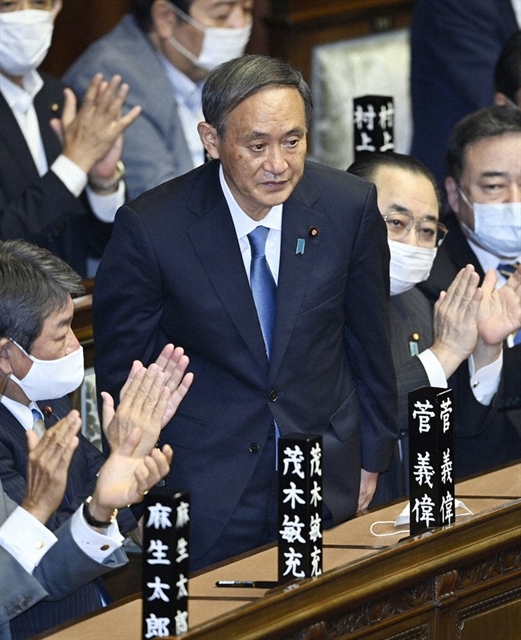 World
World


|
| Yoshihide Suga, the new leader of the ruling Liberal Democratic Party, stands up after being chosen as Japan's new prime minister during an extraordinary parliament session in Tokyo on Wednesday. — KYODO/VNA Photo |
TOKYO — Yoshihide Suga, the new leader of the Liberal Democratic Party, was elected Japan's prime minister by parliament on Wednesday, with his immediate focus to be reviving the battered economy while keeping the novel coronavirus under control.
Suga has pledged to push forward with former Prime Minister Shinzo Abe's policies such as "Abenomics," a mix of measures aimed at beating deflation and spurring growth in the world's third-largest economy, and will form a Cabinet later in the day expected to be filled with familiar faces who served in the previous administration.
The 71-year-old farmer's son, who unlike Abe and many other lawmakers in Japan is not the scion of a political dynasty, has hinted at the possibility of additional steps to shore up the economy.
This would come on top of a 230 trillion yen ($2.2 trillion) package the government has already set out for tackling the COVID-19 outbreak, including subsidies for beleaguered businesses and promotion of domestic tourism.
He will also take over a sweeping review of Japan's national security policy that was initiated by Abe after plans to introduce a U.S.-developed missile defence system were scrapped due to technical issues.
Health minister Katsunobu Kato has been tapped to succeed Suga as chief Cabinet secretary, a key post that serves as both a policy coordinator and the government's top spokesman. Many other Cabinet members such as Finance Minister Taro Aso and Foreign Minister Toshimitsu Motegi are expected to be retained.
Defence Minister Taro Kono is slated to be named minister in charge of administrative reform, an area Suga has promised to focus on to reduce bureaucratic sectionalism.
Abe's Cabinet resigned en masse Wednesday morning, drawing an end to the premier's record-long tenure of nearly eight years. He announced in late August that he needs treatment for a chronic bowel disease.
"I have spent every day putting my all into economic recovery and diplomacy to protect Japan's interests," Abe told reporters at the prime minister's office. "It is my honour to have been able to work on a range of issues along with the people during this time. I want to thank everyone from the bottom of my heart."
The Diet convened an extraordinary session in the afternoon to elect his successor, a foregone conclusion as the ruling coalition of the LDP and junior partner Komeito has a majority in both chambers. Suga received 314 votes in the 465-member House of Representatives and 142 votes in the 245-member House of Councillors.
After announcing the members of his Cabinet, Suga will be formally inaugurated in a ceremony at the Imperial Palace and hold a press conference in the evening. His tenure will last through the remainder of Abe's term as LDP leader until September 2021.
Suga will be the oldest prime minister to take office since Kiichi Miyazawa in 1991.
Aside from tackling the short-term economic damage the coronavirus has caused by forcing people to stay home and wiping out tourism from overseas, he will be tasked with stemming the country's falling birth rate and improving its dismal fiscal health.
He has also vowed to continue with Abe's push to amend the post-war Constitution by adding an explicit reference to the Self-defence Forces and work toward securing the return of Japanese nationals who were abducted by North Korea in the 1970s and 1980s. — KYODO




